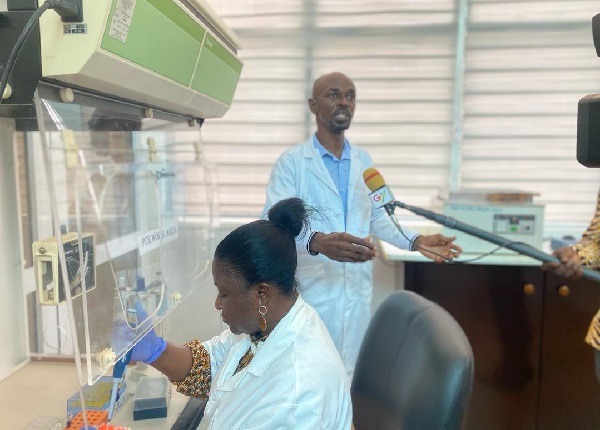
The Plant Disease Research Centre, a unit under the Biotechnology and Nuclear Agriculture Research Institute of the Ghana Atomic Energy Commission (BNARI-GAEC), in collaboration with two other institutions are discussing plans to conduct a nationwide survey on two major emerging plant diseases in the country.
The survey, which will be conducted on Banana Bunchy Top disease (BBTD) and Citrus greening, will be done together with the Centre for Agriculture and Biosciences International (CABI), a UK-based non-governmental organisation, and the Plant Protection and Regulatory Services Directorate (PPRSD) of the Ministry of Food and Agriculture (MoFA).
The two diseases
The Banana Bunchy Top disease reduces the growth of banana plants and causes bunching of newly emerged leaves, making the affected plants not to produce any fruits.
Infected plants are a source of inoculum for further spread, which can lead to serious commercial losses if not promptly eradicated.
On the other hand, the citrus greening is transmitted primarily by insect vectors (citrus psyllids), but can also be spread through plant grafting and movement of infected plant material.
The citrus greening is regarded as one of the most serious citrus diseases in the world. Once infected, most trees die within a few years.
Why the survey?
The Manager of the Plant Disease Research Centre of BNARI, Dr Andrew Sarkodie Appiah, who disclosed the planned nationwide disease survey in an interview with some selected science journalists in Accra last Friday, May 10, 2024, said the exercise had become necessary due to the proximity and the threat that the disease posed to the country’s agriculture.
Dr Appiah, a plant virologist, who was speaking in connection with this year’s International Day of Plant Health, said a vector of the citrus greening, for instance, had been identified in the Volta Region, making the chances of the emergence of the disease in the country highly possible.
On the case of banana bunchy top disease, he noted, even though the disease is known mainly in Central and Eastern Africa, it had been identified recently in Benin, a country which is not too far from the country.
For him, it was time policy makers, the NGOs, and other farming agencies supported research to identify and characterised plant diseases in the country.
“So, I’m calling on all, especially policy makers, the NGOs, and other farming agencies to support research in this direction so that we are able to identify all; somehow create a database of the diseases and pests that we have in the country to enhance, especially breeding for resistance,” he stated.
He explained that when the nationwide survey was conducted, it would help to establish either the presence or the absence of the disease in the country.
“When it happens that the disease is in the country, we quickly move in to contain the situation and have it eradicated with the help of the Plant Protection and Regulatory Services Directorate (PPRSD),” Dr Appiah added.
Impacts of plant diseases
Dr Appiah said annually, up to about 40 per cent food loses globally, and losses in trade-offs of agricultural products, amounting to about US$220 billion was attributed to plant diseases and pests.
In Ghana, he noted, about 30 per cent yield loses were due to pests and diseases, pointing out that this situation affected many vulnerable people, particularly smallholder farmers whose livelihoods depended on agriculture.
He expressed the concern that yield losses due to plant diseases and pests had pushed a lot of people into poverty and malnutrition, a situation he observed, would make it difficult for the country to achieve Sustainable Development Goals (SDGs) 1 and 2, which is to end hunger and poverty.
“When we come to Ghana, there are several plant diseases that militate against our agriculture,” citing Cassava Mosaic disease; Tomato Yellow Leave Curl disease; Blast of Rice disease; Yam Mosaic disease; Blackpod disease of cocoa; Cocoa Swollen Shoot; and Cape St. Paul’s Wilk diseases as some of the example.
Dr Appiah explained that “despite efforts put in to control these diseases, the situation still persists and has been exacerbated by climate change,” adding that “and this climate change has created new ecological niche for these plants pathogens and insect pests.”
He said “there is emergence and re-emergence of plant diseases and pests”, citing Banana bunchy top disease; Cassava Brown Streak disease; FOC TR4; Citrus greening disease; and Maize Lethal Necrosis disease as some of the diseases yet to be recorded in the country.
He mentioned, for instance, that the FOC TR4 is a devastating disease for banana and plantain, explaining that “when bananas are infected, the conductor tissues are destroyed such that the plant can no longer absorb water”, leading to its death.
Lack of funds
Dr Appiah said even though the laboratory of the centre remained one of the highly equipped facilities in the country, it lacked the ability to conduct certain studies due to lack of funds.
“We have the expertise. What we lack is the funding support to be able to undertake such study because surveillance involves a lot of money,” he appealed for help.
He said the reagents which were used at the lab were very expensive and that “we cannot get them locally to purchase. We have to import them.”
He indicated that because of lack of funding, the centre was unable to carry out a nationwide surveillance.
For Dr Appiah, plant health is an issue that should be of concern to all, particularly policy makers and farmers.
READ ALSO:
